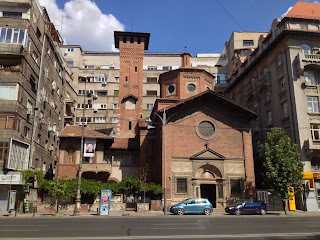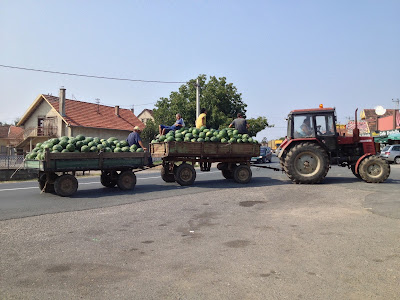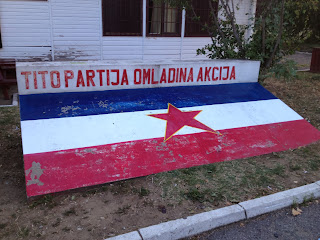Romania
I visited Romania on a trip across the Balkans in 2013. This post summarizes my impressions from this complicated country. Bucharest was the starting point.
The world’s second biggest building, the Palace of Parliament, stands in the middle of this unprosperous city. Going inside evokes strong feelings, including astonishment in the first place, followed by doubt and disgust in the end. All this gold and marble was thrown away here in order to demonstrate the opposite of what Romania actually is – a needy country. A great deal of natural and human resources were invested in this building, which is a complete contrast to the rest of the land. Gray ugly blocks of flats next to a very old church give an impression of disrespect for culture heritage. There is enough space in the streets around me but due to the architecture I feel closely claustrophobic.
 While spending the plastic Romanian money on a ticket to Tulcea we meet an English couple who are also desperately trying to communicate in the
local language. English is not that popular here. The next day we take a bus ride to Tulcea and feed some skinny dogs, the symbol of Balkans.
While spending the plastic Romanian money on a ticket to Tulcea we meet an English couple who are also desperately trying to communicate in the
local language. English is not that popular here. The next day we take a bus ride to Tulcea and feed some skinny dogs, the symbol of Balkans. Tulcea is rather touristy and we enjoy staying in a good hotel on the lake for a good price. The next day we get to Sulina, a place on the border into Ukraine. There is a guy on the jetty offering accommodation. He has mastered about 10 English words so far, but it’s enough to secure a room for us in a guest house not far from the harbor. Only a few people speak foreign languages and it’s very difficult to arrange a boat trip where we want to watch the unique birds of the Danube delta. The guy who arranged our accommodation seems to be everywhere at the same time. When he spots a chance of doing something for us he interrupts our difficult conversation with one of the locals who have boats. This time he uses the same 10 English words but in a different order, thinking that he can express more in this way. One of his favorite words is ‘patrón’ which he repeats rapidly when pointing at a guy. The meaning of it is a mystery. There are more fishermen with boats, but when we try talking to them, the 10-words-guy shows up yelling ‘patrón today’again and ruins it for us. He doesn’t care that he’s not wanted around and keeps bothering us. After meeting some cows on the sandy beach, we talk to our host and he agrees to take us for the boat trip. He explains that the 10-words -guy is making money by bringing tourists to guesthouses and guides.
It becomes more obvious that Sulina doesn’t have any tourist attractions except for the Danube delta. The English couple whom we met in Bucharest is walking down the street no. 1 (there are like four streets and they don’t have names, just numbers) and it feels good to see somebody who’s probably experiencing the same odd situations here, at the end of the world. ‘What do you think of this place?’ they ask us. We remain silent, looking at each other quickly and trying to find some civilized words. Strong laughter on both sides follows. ‘We thought the same’ they reply to themselves. We agree on a dinner together later in a nearby restaurant.
The boat trip lasts four hours. The guide takes our boat through a narrow channel where birds are scarce and water lilies flourish and blossom. Only tall weed grows above the water level yet it provides enough support for nests. We see the English couple AGAIN as their own boat catches up with us. Are we being followed by MI5? Later on we leave the channel and we enter the delta where we can’t tell the border between see and river anymore. Younglings on water lilies beeping for their mothers, thousands of seagulls, pelican family and all kinds of birds I can’t even name make this evening extraordinary. Coming here when the sunset starts is strongly advised! This was worth all the trouble getting here, to the edge of Europe.
After the dinner (and making sure that the English guys are really not following us) a drink of local spirits seems like a good idea, but the local bars don’t serve any Romanian alcohol. We’re spending the last night in a private house in the presence of its inhabitants. They are friendly people, but I will never understand how they can build a dry toilet in the yard where their children play. You see them run around when you’re sitting inside. Our bed is very old and the room is tiny, but we get to enjoy the place from the locals’ point of view.
In the morning the family makes tea for us, we exchange contacts and say goodbye. Although we don’t feel like going back to Bucharest, a train takes us slowly towards it. We spend one day in parks and the night in a well-known hostel to avoid even more unpleasant experiences in this city.
This trip has shown me how close a distant place can be and the other way around. The Balkans is full of unexpected situations and worth exploring if you’re ready to get surprised!




